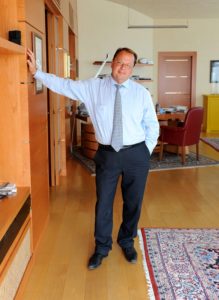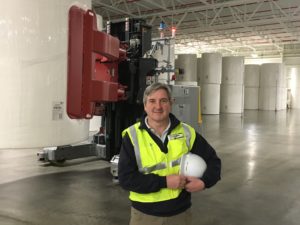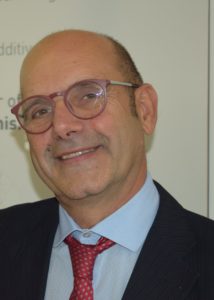The Italian group Sofidel, owner, amongst other things, of the famous Regina brand of household tissue products, has built its largest, most modern and sustainable integrated plant in the United States, which thus includes both the manufacturing and processing of paper. This is why it has invested 400 million dollars in this factory employing 700 people, which equipment it has chosen and what its objectives are.
Sofidel is not perhaps a name well-known to the general public, but you just need to mention Regina rolls, one of its many brands, for everyone to know what this group produces. It was founded in 1966 in Porcari (Lucca) by Emi Stefaniand Giuseppe Lazzareschi, and today it is a multinational occupying second place in Europe and sixth in the world for its manufacturing capacity in the paper sector for sanitary and household use. With a presence in thirteen countries, it sells more that half its products as private label, has a turnover which is around 1.7 billion euros, six thousand employees and a manufacturing capacity which is over a million tons a year. Sofidel’s history has gone through several basic stages: in the 1970s growth was in the internal market and exporting finished products to France and Germany. Since 1997, on the other hand, internationalisation continued, launching production directly into new markets through, firstly, greenfield investments and, then, following the 2008 crisis, purchases. It is a group in continuous expansion, as the recent opening of a new integrated factory, in Circlevillein Ohio testifies to. This has required an investment of 400 million dollars and, when fully operational, it will employee 700 people. Its objective will be to expand the multinational’s presence in the United States, where it is active in Nevada, Florida, Oklahoma, Wisconsin, Mississippi, Ohio and Pennsylvania. «The United States market», declared Luigi Lazzareschi, managing director of the Sofidel Group, «is today worth about 15% of the Sofidel turnover and is a crucial market for us, where we intend to grow even more. This new, large and modern factory is intended to be of significant use for our development within a highly competitive environment but equally one which is full of opportunities. An investment which, in accordance with our usual strategy, combines production efficiency and sustainability».

«That strategy of growth through a mixture of greenfield investments and purchases, that we have already been carrying out in Europe over the last few years, is now gradually taking shape in the United States as well», added Emi Stefani, president of the Sofidel Group. «A strategy that we consider to be crucial in also consolidating our growth in the American market».
The new American factory
To learn more about this installation, we spoke with Marco Lombardi, Sofidel America site operations manager. «Since 2012 – the manager tells us – we have been operating in the United States, initially with a purchase and then through the purchase and construction of new installations. Throughout this process sustainability – in particular environmental sustainability – has always represented a strategic lever of growth and competitive development. The Circleville installation, which we have recently opened, is, today, the largest, most modern and sustainable one in the Sofidel Group. It stands on an area of 114.5 hectares just by a strategic logistic intersection for distributors, with intermodal systems, an airport and large urban centres within a radius of a few hundred kilometres. Thanks to these characteristics, from Circleville we can serve a vast area of the United States, the foremost market in the world for the consumption of tissue paper per capita and a country crucial for the future growth of the group».

As we were saying, it is an integrated factory, that is, it includes both the paper mill stage – from cellulose to paper – and the processing stage – which leads to the finished product. A plant which is characterised by the adoption of innovative technologies for the paper mill, converting and warehousing phases. But, more precisely, what machines operate in the new factory? «At Circleville – continues Lombardi, – two Advantage NTT paper mill machines from Valmet have been installed, with an overall manufacturing capacity of 140 thousand tons/year. They are both already working and fully operational. The Advantage NTT 200 technology enables the manufacture of both conventional tissue and textured paper, and will allow Sofidel to raise the quality of its products even more and to further improve its energy efficiency. Each of the two machines is 5.5 metres wide and has a speed of 2 thousand metres a minute. With regard to the second phase of production, the transformation phase, 10 converting lines have been installed at Circleville in order to make the finished product. Three of these lines are Fabio Perini’s Constellation, characterised by an innovative technology which offers an improved winding quality, keeping the softness of the product and guaranteeing uniform tears from the start to the end of the rolls. On the other hand, with regard to the warehouse, we have completely automated the management of the finished product. Thanks to the Smart Store automatic system, we are able to manage more than 50 thousand pallets of merchandise, saving up to 40% of space compared with a conventional solution». Designing and creating an installation of this kind is not easy, taking into account the required authorisations and bureaucracy upstream.
Bureaucracy and sustainability
We asked Lombardi what are the differences, in this respect, between starting up an installation of this size in the USA compared with in Italy and other areas in the world. «The construction time of the installation in Circleville, – explains the manager, – was about two years from laying the first stone to opening on 3 October last year. The main difference between the USA and Italy lies in the much leaner bureaucracy, which enables even complex authorisations to be obtained in significantly shorter times compared with what happens in our country. I think it is also fair to underline the excellent support offered by institutions at all levels, from the Federal to the State Government, to Pickaway County and the city administration». Environmental sustainability, probably also in order to smooth the route for obtaining authorisations as the Sofidel manager mentioned, was one of the key points of the new environmental programme. «It has been, in fact – states Lombardi – a fundamental factor also for the integrated factory in Circleville. In this connection, we have implemented a recovery system for the heat generated by the turbine, which will be used to dry the rolls of paper and, later, recovered to make steam. This system will supply almost all the energy required for drying the paper and, under certain conditions, will be able to power the whole machine. Furthermore, cogeneration plants have been installed to produce both steam and electrical energy, as well as the use of machines for paper manufacture which represent the state of the art, not only from a quality point of view, but also for energy efficiency, allowing us to contain consumption and emissions of CO2in the atmosphere».
The logistics approach adopted for the new factory is also interesting, as Lombardi emphasises in conclusion, «on this front we have applied some technologies taken from the food & beverage industry to a tissue factory. In particular, we have developed, thanks to 100% Italian technology, an automatic system of transferring rolls between the paper mill and converting stages, and finished products from converting to the automatic Smart Store warehouse, through the use of vehicles with laser technology which move the loads in a fully autonomous and efficient way».
Sofidel rewards Ecoverde
Sofidel Suppliers Sustainability Awardis the award that the Italian multinational gives to suppliers who distinguish themselves through environmental and social sustainability actions. The award has arrived at the third edition, held in the United States, and is based on the platform TenP – Sustainable Supply Chain Self-Assessment Platform, devised and promoted by the Fondazione Global Compact Network Italia (Fondazione GCNI) [Italian Global Compact Network Foundation], a self-assessment tool for performance built on the Ten Principles (TenP) of the United Nations Global Compact which, following the most relevant and up-to-date international standards and agreements on sustainability, takes into consideration matters relating to human rights, working conditions, protection of the environment and fight against corruption, with the aim of identifying common challenges and solutions in order to improve sustainability within the supply chain. Amongst the companies which have obtained the highest score based on this platform, the Italian company Ecoverde gained the “Best Supplier” award. This company specialises in auxiliary chemicals for paper processing, water treatment, plants, machinery and kits for the industry. With its headquarters in Porcari (LU) and in operation since 1985, it is deeply involved with the paper industry and supplies products and services to all the largest Italian production plants.

«This involves – explains Paolo Lazzari, president of Ecoverde – a know-how which encompasses not only the two types of paper essentially produced in the local area – packaging and tissue -, but also graphic and special papers. Our central prerogative is a laboratory which is able to reproduce on an applicable scale the basic manufacturing processes and subsequent prestigious finishes of the various types of paper. Substantially, the various types of chemical treatment are developed and then tested in plants in accordance with the results of laboratory tests. This allows the identification, with reasonable accuracy, of an effective treatment which can meet the requirements of each individual client, bearing in mind the specific working conditions. Our particular attention to safety and respect of environmental regulations is reflected in all stages of the production chain: from manufacturing to laboratory tests, to the end application at the client’s site». And as regards your collaboration with Sofidel? «I consider that all the guidelines which I have mentioned», concludes Lazzari, «are strongly in tune with Sofidel’s policy regarding sustainability. Our partnership with Sofidel has been a long-standing relationship; it started, in fact, at the beginning of the 1990s and has developed and grown over time, both in paper manufacture and water purification, and in technical paper. Currently we are following various projects on newly designed products which Sofidel intends to launch on the market. A continuous comparison between the research and development of the two companies brings solutions which are shared, innovative and of low environmental impact. A characteristic of Sofidel which we particularly appreciate is that, even though they are a multinational with manufacturing sites outsourced throughout Europe and in the United States, they maintain and promote a research and development structure which is strongly rooted on our territory, thereby adding value to all the related local high-technology organisations».
